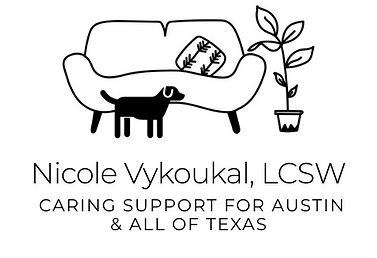Grief and Depression
- Nicole Vykoukal, LCSW
- Jun 3, 2023
- 2 min read
Did you know that loss can trigger depression? It’s true. A significant loss, such as the death of a loved one (including your companion animal), could trigger symptoms of depression. You can suffer from both depression and bereavement simultaneously. A double whammy.
Symptoms of depression can include:
Weight loss or weight gain
Increased agitation or irritability
Tired or loss of energy nearly every day
Exaggerated feelings of guilt or worthlessness
Less able to concentrate or make decisions
Recurrent thoughts about death or suicide
Trouble sleeping (insomnia) or sleeping too much
Feelings of sadness, hopelessness, and emptiness for most of the day
Less ability to derive pleasure from or less interest in activities that were previously enjoyed.(Symptoms from Diagnostic and Statistical Manual of Mental Disorders, Fifth Edition)
If you are experiencing a loss and depression runs in your family or you have experienced depression before, you are at higher risk of slipping into a depressive episode.
When you are suffering from deep sadness, a sense of emptiness, hopelessness, or other symptoms, it is common to be self-critical and to try to think yourself into feeling better, only to find your attempts do not work. Failed self attempts to cure symptoms can cause more anger and frustration with yourself for not being able to just snap out of it.
When bereavement and depression occur together the symptoms and impairment tend to be more severe (DSM-5). Please know that it is okay and understandable to need help. Similar to how it is okay and understandable to seek treatment when you are physically injured or sick.
Some supportive resources to consider are:
1. A mental health provider in your community who specializes in bereavement and depression. You can search on www.psychologytoday.com for psychotherapists, psychologists, psychiatrists, and support groups in your area.
2. The National Alliance on Mental Illness (NAMI). Visit their webpage to find information and support http://www.nami.org/.
3. National Suicide Prevention Lifeline, Call 1-800-273-8255, Available 24 hours every day.
4. The book The Mindful Way through Depression: Freeing Yourself from Chronic Unhappiness, by Mark Williams, can help you understand and address depression in a self-compassionate manner. You may want to seek the support of a mental health provider (counselor) while you read and process through the book.
5. Seek spiritual guidance that resonates with you. Death of a loved one and depression often raise spiritual and existential questions. Many folks find connecting with a spiritual community, spiritual literature, or spiritual practices and traditions helpful during dark times.
Death, grief, and depression can trigger intense feelings of aloneness. If you have recently suffered a loss and you think you may be experiencing depression, you are not alone. Depression is one of the most common mental health challenges people face today. Know that reaching out for help is one of the most compassionate and loving things you can do for yourself.




Comments